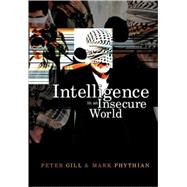
| List of Figures, Tables and Boxes | x | ||||
| Preface | xi | ||||
| Abbreviations | xiv | ||||
| 1 What is Intelligence? | 1 | (19) | |||
|
1 | (7) | |||
|
8 | (7) | |||
|
15 | (1) | |||
|
16 | (2) | |||
|
18 | (2) | |||
| 2 How Do We Understand Intelligence? | 20 | (19) | |||
|
20 | (1) | |||
|
21 | (2) | |||
|
23 | (3) | |||
|
26 | (1) | |||
|
27 | (2) | |||
|
29 | (6) | |||
|
29 | (2) | |||
|
31 | (1) | |||
|
32 | (2) | |||
|
34 | (1) | |||
|
35 | (4) | |||
| 3 Who Does Intelligence? | 39 | (23) | |||
|
39 | (2) | |||
|
41 | (16) | |||
|
42 | (10) | |||
|
52 | (2) | |||
|
54 | (1) | |||
|
55 | (2) | |||
|
57 | (3) | |||
|
60 | (2) | |||
| 4 How Do They Gather Information? | 62 | (20) | |||
|
62 | (1) | |||
|
62 | (1) | |||
|
63 | (1) | |||
|
64 | (13) | |||
|
64 | (6) | |||
|
70 | (4) | |||
|
74 | (3) | |||
|
77 | (1) | |||
|
78 | (3) | |||
|
79 | (1) | |||
|
79 | (2) | |||
|
81 | (1) | |||
| 5 What Do They Do with the Information Gathered? | 82 | (21) | |||
|
82 | (2) | |||
|
84 | (4) | |||
|
88 | (7) | |||
|
88 | (2) | |||
|
90 | (5) | |||
|
95 | (6) | |||
|
101 | (2) | |||
| 6 Why Does Intelligence Fail? | 103 | (22) | |||
|
103 | (1) | |||
|
104 | (1) | |||
|
105 | (8) | |||
|
113 | (3) | |||
|
113 | (2) | |||
|
115 | (1) | |||
|
116 | (3) | |||
|
119 | (2) | |||
|
121 | (2) | |||
|
123 | (2) | |||
| 7 Intelligence on Iraqi WMD: What Kind of Intelligence Failure? | 125 | (23) | |||
|
125 | (1) | |||
|
126 | (10) | |||
|
128 | (1) | |||
|
128 | (3) | |||
|
131 | (1) | |||
|
132 | (4) | |||
|
136 | (5) | |||
|
139 | (2) | |||
|
141 | (5) | |||
|
146 | (2) | |||
| 8 Can Intelligence be Democratic? | 148 | (24) | |||
|
148 | (3) | |||
|
151 | (1) | |||
|
152 | (4) | |||
|
156 | (5) | |||
|
161 | (5) | |||
|
166 | (2) | |||
|
168 | (1) | |||
|
169 | (3) | |||
| 9 Conclusion: Intelligence for a More Secure World? | 172 | (8) | |||
| Notes | 180 | (24) | |||
| Bibliography | 204 | (19) | |||
| Index | 223 |
The New copy of this book will include any supplemental materials advertised. Please check the title of the book to determine if it should include any access cards, study guides, lab manuals, CDs, etc.
The Used, Rental and eBook copies of this book are not guaranteed to include any supplemental materials. Typically, only the book itself is included. This is true even if the title states it includes any access cards, study guides, lab manuals, CDs, etc.